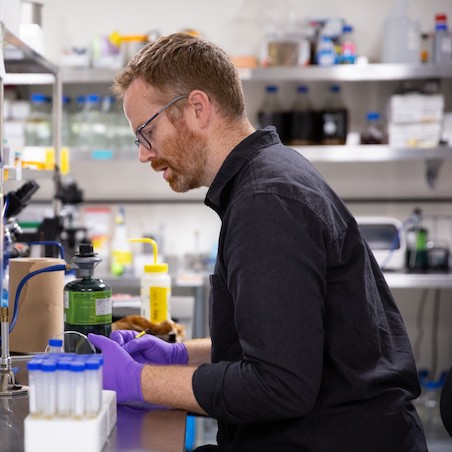Angus Ross
Co-founder, Escarpment Laboratories
Bachelor of Science (Hons), 2007
We had this big, fancy molecular biology lab at our disposal. Of course, we were going to use it.
University students enjoy beer but not everyone parlays that interest into a career. For Angus Ross it led to the creation of Escarpment Laboratories, a unique Canadian company that supplies liquid yeast to breweries.
Angus graduated from King’s with a combined honours in biochemistry and the History of Science and Technology (HOST). He pursued graduate studies in molecular cell biology at the University of Guelph, where, in 2013, the idea for Escarpment started to grow.
Angus and a Guelph classmate, Richard Preiss, had taken up homebrewing as a hobby and were using the university’s lab to save and reuse yeast from batch to batch. “We got to thinking,” says Angus, “where are Canadian brewers getting their yeast?” Breweries that prided themselves on producing a local beer were using local hops, local water, and local malt—but had to bring in yeast from as far away as California.
Yeast plays a vital role in beer making. It eats up the sugar and turns it into alcohol. It also produces carbonation and has an influence on the aroma and taste of the product. Just as the landscape and climate creates a local terroir for wine, all the ingredients in beer—including the yeast—create one too.
Local brewing had turned into a booming market. “Every small town in Canada was getting a new brewery every year,” says Angus. “Throw a stone in any small town and you’ll either hit a brewery, or one in the planning. This was an opportunity to use our yeast expertise in a productive way.”
Today, located in one of Guelph’s industrial parks, Escarpment Laboratories is an important supplier to the Canadian brewing industry with over 30 employees. The company has banked over 400 strains of yeast that produce everything from fruity, hazy IPAs, to big, imperial stouts.
“We not only supply this key ingredient,” says Angus, “we act as a knowledge base, as a source of research. We put a lot of effort into developing new products and contributing to the research that helps breweries make the best beer possible.”
And it doesn’t stop at beer. “Everyone who works at Escarpment is a bit of a foodie,” says Angus, “and most of us make our own sourdough bread. So it made sense to release a sourdough product.”
They also have a kombucha ‘SCOBY’ (an acronym that stands for ‘symbiotic culture of bacteria and yeast’) and are exploring the world of non-alcoholic beers, a category that has been growing in popularity post-pandemic. While some stats showed Canadians’ alcohol consumption rose during Covid-19, that shifted in 2021. “We saw a drop in home consumption that wasn’t compensated by an increase in bar consumption,” says Angus. “The market trend is toward non-alcoholic products. I think every brewer wants to have at least one non-alcoholic product on their tap list now.”
Looking back on his time as a student, he credits the Foundation Year Program (FYP) and HOST programs for helping him understand “where we came from and how we’ve come to know what we know,” as well as “how science is an ever-changing body of knowledge.”
Of FYP in particular, he adds, “a lot of scientists go through undergrad never having to write a humanities essay. FYP helped me with that. Learning how to deal with deadlines, and that kind of critical analysis sets someone up to be able to thrive in whatever industry they go into.”
So what’s his favourite beer? Just like science, that answer has evolved. “I started out liking the big, bold beers. In-your-face hops. As much alcohol as possible. Flavour explosions. But today I’ve mellowed out and have come to appreciate the more subtle things. I like something very traditional; I would go for the freshest, crispest lager I can find that’s been made as close to where I am as possible.” And that’s what Escarpment’s efforts are all about.
